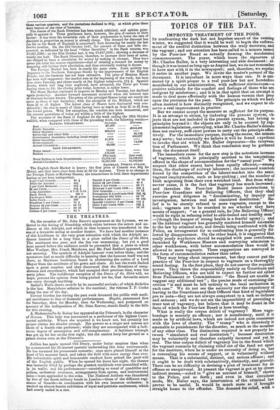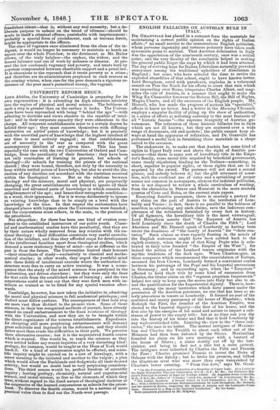TOPICS OF THE DAY.
IMPROVED TREATMENT OF THE POOR.
IN confronting the dark but not hopeless aspect of the coming winter, we suggested that it would be well to begin the enforce- ment of the needful distinction between the truly destitute, and the vagrant ; and our attention has been called to a minute issued
by the Poor-law Board as actually forming the desiderated
commencement. The paper, which bears the signature of Mr. Charles Buller, is a very interesting and able document : though it was issued so long ago as August last., we do not remember to have met with it in the newspapers; and, therefore, we reprint it entire in another page. We invite the reader's perusal of the document. It is important in more ways than one. It is ani- mated by a spirit proper to a real poor-law but not heretofore manifested in our administration, with sufficient distinctness—a positive solicitude for the comfort and feelings of those who are indigent by misfortune ; and it is in that spirit that an attempt is made to deal more effectually with the human vermin that prey upon the provision for the poor. The principle on which we have often insisted is here distinctly recognized, and we expect to ob- serve a real improvement in practice.
But we cannot accept the measure as svfficient for its purpose.
It is an attempt to obtain, by tinkering the present system, oh- jects that are not included in the present system, but belong to principles beyond it : the objects are only to be secured by.sup- plemental legislation, conveying, what Mr. Charles Buller's minute does not convey, sulh cient powers to carry out the principle effec- tively. For the immediate purpose, during the recess, the minute may serve • but eventually we believe it will be found expedient to invoke that aid which Mr. Buller deprecates—the interven- tion of Parliament. We think that conclusion may be gathered from the document itself.
The immediate cause for the new step is the notorious increase of vagrancy, which is principally ascribed to the temptations offered in the shape of accommodation for the" casual poor." We suspect that other causes have been equally efficient,—among them, the discharge of railway labourers; the increased numbers forced by the competition of the labour-market into the semi- vagrant employments, such as hop-picking ; and the number of Irish migrating from their own wretched land. But from what- soever cause, it is the fact that vagrancy has much increased; and therefore the Poor-law Board issues instructions to Poor-law Guardians and Relieving Officers, that they shall exercise great diligence in "discriminating, by inquiry and
investigation, between real and simulated destitution. Re- lief is to be sternly refused to mere vagrants, except to the tick ; vagrants are to be searched to see whetherthey have means of support; "as- a general rule, he [the Relieving Officer] would be right in refusing relief to able-bodied and healthy men" —[though the hunger of strong health is a fearful agony] ; and as the habitual vagrant has generally rendered himself amenable to the law by criminal acts, and dreads being confronted with the Police, an arrangement for so confronting him is generally fol- lowed by disappearance. On the other hand, it is suggested that really needy wayfarers should be supplied with pass certificates, furnished by Workhouse Masters and conveying admission to other workhouses, with better accommodation than would be
allowed to mere vagrants. These suggestions are conveyed in the form of recommendation rather than order.
They may bring about improvement, but they cannot put the practice of the Poor-law in respect to vagrants on a thoroughly sound footing. In the first place, they do not convey the requisite power. They throw the responsibility unduly on Guardians and Relieving Officers, who are told to expect no further aid either
from Parliament or Commissioners : "the Board are unable to suggest any additional test" ; the precise mode of exercising dis- cretion "is and must be left entirely to the local authorities in each case." We do not see the necessity nor the expediency of leaving to the Guardians and their Officers that kind ot legislation pro re nata—they are not always competent to a task so delicate and arduous ; and we do not see the impossibility of providing a truer test of vagrancy, but believe that it may be found in the facts of which the Poor-law Board is here treating.
What is really the corpus delicti of vagrancy ? Mere vaga-
bondage is scarcely an offence nor is mendicancy, until it is made so by artificial laws, which are indeed not quite consistent with the laws of charity. The " tramp" who is disorderly is amenable to punishment for the disorder, as much as the member of any other class. The distinction required is not properly be- tween " simulated and real destitution " ; because destitution may be voluntarily and therefore culpably incurred and yet be real. The true corpus delicti of vagrancy lies in the fraud which the vagrant commits by claiming relief out of the fund set apart for the destitute, when he is under no necessity of doing so, but is concealing his means of support, or is voluntarily without means. That is a substantial, distinct, and serious offence; and it ought to be dealt with substantively, distinctly, and gravely. There can be no difficulty in devising a plan of treatment for an offence so unequivocal. At present the vagrant is got at by divers indirect means,—asked to give an account of himself,' shown to the Police, and so forth ; and even in that circuitous mode, Mr. Buller says, the intervention of the criminal law proves to be useful. It would be much more so if brought straight home to the offender. The demand for relief, with a
fraudulent intent—that is, without any real necessity, but a de- liberate purpose to subsist on the bread of idleness—should be made in itself a criminal offence, punishable with imprisonment : probably a special form of punishment, such as travaux forces, might be appropriate to the offence.
The class of vagrants once eliminated from the class of the in- digent, it would no longer be necessary to maintain so harsh an aspect over the whole Poor-law, to the detriment, as Mr. Buller allows, of the truly helpless—the orphan, the widow, and the honest labourer cast out of work by sickness or disaster. At pre- sent the law confounds vagrancy and poverty, and treats both by a system compounded between charitable support and a penal law. It is obnoxious to the reproach that it treats poverty as a crime; and therefore are its administrators perplexed in such seasons as the coming winter, when care for the poor demands a rigorous re- sistance of the poor man's parasitical enemy, the vagrant.

























 Previous page
Previous page